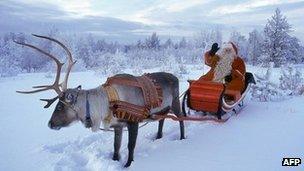UHI research warns of 'black Christmases' in Santa town
- Published

Rovaniemi is called the hometown of Santa Claus
A project led by a Scottish university has warned of an increased likelihood of snow-free "black Christmases" for the capital of Finnish Lapland by 2050.
Rovaniemi is the official hometown of Santa Claus, according to its tourism body.
The town in the Arctic Circle was among case studies for a University of the Highlands and Islands (UHI) climate change project.
Clim-ATIC was led by the Centre for Mountain Studies UHI in Perth.
Clive Bowman, a research fellow at the centre, has written about the project, external for the latest edition of the Scottish Environment Protect Agency's magazine, the Sepa View.
The three-year project that ended earlier this year, Clim-ATIC saw researchers from UHI work with experts and organisations in Greenland, Finland, Norway, Scotland and Sweden.
It looked at potential impacts of climate change on small rural communities in northern countries and strategies to adapt to new conditions.
Snow decrease
The Finnish Environment Institute has forecast that by 2050 temperatures in Finnish Lapland will rise by up to 3.8C, average rainfall will increase, there will be earlier spring floods and a shorter period when there is snow.
Clim-ATIC, external used this information and other data to investigate the vulnerabilities in Lapland's tourism market and also to put together flood hazard maps.
In his article, Mr Bowman said: "The potential economic impacts of snow melt and river flow changes in Finnish Lapland on tourism and flood protection were identified as a cause for concern.
"In response, changes in snow and floods were simulated by the Finnish Environment Institute using several climate scenarios, including a conceptual hydrological model incorporating snow."
Heating energy
He added: "In Rovaniemi, the risk of a 'black' Christmas increases as the start of the permanent snow cover is delayed.
"It is worth noting that maximum values of snow decrease less than the averages, whereas the minimum values decrease more.
"This means that, although winters with little snow will become more common in future, there will still be winters with large amounts of snow, and the variation between years will increase."
According to Visit Rovaniemi, Christmas tourism has grown year on year.
Last Christmas, about 500,000 people arrived in the town by plane or train.
Mr Bowman wrote: "At first, climate change may appear advantageous to Europe's northernmost reaches, the demand for heating energy will decrease, and crop yields and forest growth may increase.
"However, it is becoming clear that eventually the disadvantages will outweigh the benefits. Changes taking place elsewhere in the world will be reflected in Northern Europe."
- Published3 November 2011
- Published11 August 2011
- Published22 July 2011